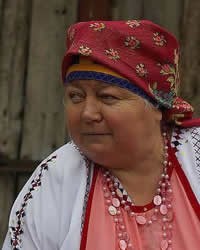Mordvinian in Kazakhstan

Photo Source:
Anonymous
|
Send Joshua Project a map of this people group.
|
| People Name: | Mordvinian |
| Country: | Kazakhstan |
| 10/40 Window: | Yes |
| Population: | 10,000 |
| World Population: | 108,500 |
| Primary Language: | Erzya |
| Primary Religion: | Christianity |
| Christian Adherents: | 65.00 % |
| Evangelicals: | 1.00 % |
| Scripture: | New Testament |
| Ministry Resources: | Yes |
| Jesus Film: | Yes |
| Audio Recordings: | No |
| People Cluster: | Finno-Ugric |
| Affinity Bloc: | Eurasian Peoples |
| Progress Level: |
|
Introduction / History
The Mordvinian people speak two languages, Moksha and Erzya. They consider these two languages to define two separate ethnic groups.
They are from Mordovia, a republic within western Russia. The first written mention of them was in the 500s. The Mongol Empire overran Mordovia in the 1200s, but it fell under the rule of Ivan IV of Russia in 1552. They have been dominated by the Russians ever since. During the Soviet Era, they were scattered, and today they live in 10 different countries that were once part of the USSR.
What Are Their Lives Like?
No matter where the Mordvinian live, they have their own cuisine, based on fish. Mushrooms are a common ingredient in Mordvinian dishes. They also eat meat, fresh fruit, carrots, beans, cabbage, cucumbers, potatoes, garlic, pumpkins, beets, turnips and radishes. They eat all kinds of grains, not just wheat, but spelt, barley and rye. They use these grains to make bliny, a thin pancake.
What Are Their Beliefs?
Though a small number still adhere to their ancient religion, most Mordvinian are now Russian Orthodox. They have varying degrees of commitment to the church and to the savior. Many are secular.
What Are Their Needs?
The Mordvinian need to keep their eyes on Jesus and allow him to guide their families and communities.
Prayer Points
Pray for the guidance of the only savior to lead the Mordvinian people into a time where they flourish economically and spiritually.
Pray for Mordvinian disciples to make more disciples.
Pray for spiritual hunger and a strong commitment to Jesus Christ in the Russian Orthodox Church.